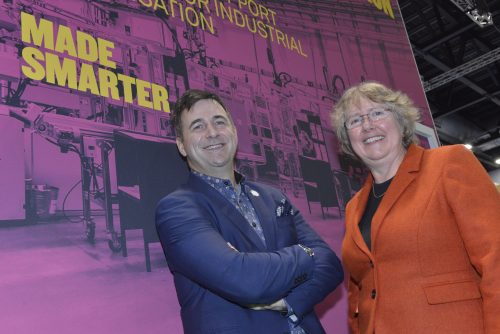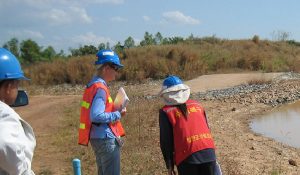Taking the smart approach to the new industrial revolution

The North West is taking the lead in the industrial revolution through a pioneering approach that could be a major weapon in the battle to increase the UK’s productivity.
‘Made Smarter’ is all about the adoption of new industrial digital technologies. The aim is to increase productivity by 25 per cent and grow the North West’s economy by £115m.
Backed by national government and some of the region’s globally recognised businesses, the Made Smarter programme, launched last November, is looking engage with 3,000 SME manufacturers across the region.
The aim is to increase the uptake of digital technology down manufacturing supply chains. If successful the programme will be adopted nationally.
The roll out of the programme in the North West is being coordinated by Donna Edwards, managing director for business support and business finance at the Manchester-based Growth Company. She says: “If we get it right here, it can help the whole of UK plc.”
Companies that get involved will get the chance to access match funded support and advice on how digital technologies, including robotics, artificial intelligence, 3D printing and the Internet of Things, could revolutionise their manufacturing processes.
Embracing Made Smarter could also help open up new markets, increase exports and create hundreds of additional high-skilled, high-value jobs.
Edwards says progress is being made and she is pleased with the start that has been made as Made Smarter looks to reach out and connect with SMEs.
She says: “Whilst it is still early days we are starting to see some of the real themes coming out around things such as additive manufacturing.”
She adds: “The feedback we are getting is also positive, about how there is a real need for an independent voice to work with SMEs. We’re getting a real sense of people wanting to engage and find out more.”
She adds: “It is working with them in terms of where they are now, what their ambition is and where they would like to be.”
A review on industrial digitalisation revealed that Britain’s manufacturing sector could unlock £455bn over the next decade.
The prize is large and to help deliver it a formal partnership between the Department for Business, Energy & Industrial Strategy (BEIS) and the private sector, has created the ‘Made Smarter Commission’.
Co-chaired by Siemens UK chief executive Juergen Maier and Business Secretary Greg Clarke, this commission includes representatives from 17 leading companies and organisations directly linked to manufacturing.
Alongside Siemens, which employs 2,000 people in the North West, other members with a presence in the region include Airbus, Jaguar Land Rover, Rolls-Royce, and BAE Systems.
Manufacturer is one of Burnley’s major employers
Window frame manufacturer VEKA is one of Burnley’s major employers and a champion for the Made Smarter drive.
The group’s head of technical Paul Kennington is actively promoting the benefits of embracing more digital technologies into the production process and is urging other businesses to get on board.
He says: “Made Smarter is very important to the continued growth and success of small and medium sized enterprises in the North West.
“In an area filled with new facilities to support digital technology, Made Smarter allows local companies to maximise these assets and better understand the commercial advantages available through the technology.
“It creates a forum for businesses to collaborate and will deliver growth in productivity undoubtedly leading to new opportunities.”
Kennington says VEKA has invested in a number of digitalised technologies to improve productivity and customer service.
He explains: “Our ‘High Bay’ logistics solution uses advanced digital technology to automate picking of products for customer orders.
“Throughout the night it reads the orders electronically, placing faster moving stock closer to the distribution points.
“Throughout the day the high bay then delivers the stillages to the distribution points, completing 100 picks per hour.
“Our technical team have invested in 3D printers, allowing us to design and create ‘products’ for customers, something that until recently would have only been available as a design drawing can now be delivered as an actual working part. These are just two examples of a constant investment.”
He adds: “Our customers demand and deserve great service and innovation. For many this will mean a unique part or an improvement to an existing part for their own design of product and this can create a barrier to their growth.
“The introduction of additive manufacturing and technology allows us to design and print trial parts for customers that are financially viable and fast.
“We can adapt parts quickly and we can produce simple jigs to help our customers without fuss or reliance on third parties.
“The improvements through our own design process are such that we are able to trial new designs, highlighting issues, ensuring compatibility with third party products and resolving problems before committing to huge expense in tooling, something demonstrated through our production of a fully printed working window. “
Kennington says: “There is plenty of support out there and seeking out schemes such as Made Smarter will offer partnerships with local companies and universities who can support businesses on their journey.”







